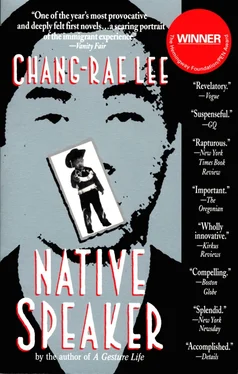He loved the old man, adored him. Whenever you looked, Mitt was scaling the wide bow of that paternal back, or swinging from his shoulders, or standing on the tops of his feet so that they walked in tandem, with ponderous, doubled soles.
There were certain concordances. In profile, you saw the same blunt line descend the back of their necks, those high, flat ears, but then little else because Lelia — or maybe her father — had endowed Mitt with that other, potent sprawl of limbs, those round, vigilant eyes, the upturned ancestral nose (like a scrivener’s, in my imagination), his boy’s form already so beautifully jumbled and subversive and historic. No one, I thought, had ever looked like that.
The kids in my father’s neighborhood gave him trouble that first summer. One afternoon Mitt tugged at my pant leg and called me innocently, in succession, a chink , a jap , a gook . I couldn’t immediately respond and so he said them again, this time adding, in singsong, “Charlie Chan, face as flat as a pan.”
They’re just words, I then told him firmly, confidently — in the way a father believes he should — but mostly because I didn’t know what else to say. And after the same kids saw Lelia and me play with him in the front yard they started in with other things, teaching him words like mutt, mongrel, half-breed, banana, twinkie. One day Mitt came home with his clothes soiled and said that they had pushed him down to the ground and put dirt in his mouth. He proudly told my father that he hadn’t cried. Lelia, who up to now had been liberal and assured, started shrieking angrily about suburbia, America, the brand of culture we had to live in, and packed Mitt up the stairs to scrub his muddy face, telling him all the while how wonderful he was.
That evening my father and I went around the neighborhood to talk to the parents. We walked stiffly in silence on those manicured streets, and it seemed a repetition of a moment from many years before, when an older boy named Clay had taken away my cap pistol. I remembered how my father had spoken to Clay’s mother in a halting, polite English and how he had excused her son for taking advantage of my timidity and misunderstandings.
“My son,” he explained, “is no good for friends.” The woman hardly understood what he said, and Clay — grinning to himself behind her and looking more menacing than ever — only temporarily handed over my toy gun.
Now, as the first front door opened, I spoke calmly and severely, explaining the situation as one of gravity but not crisis. But then, at the sight of the offending boy, the old man behind me inexplicably exploded, chopping the air with his worn fingers, cursing red-faced like a cheated peasant in our throaty mother tongue until the bewildered child began to cry. His mother protested meekly (you could tell she knew my father) and I, too, wanted him to stop yelling, to shut up and let me speak. Instead I allowed myself to sacrifice this boy and his mother, perhaps even myself, and let the old man yell this one bloody murder, if only for Mitt.
I know this: a child doesn’t forgive or forget — he works it out.
By that last summer Mitt was thick with them all. Friends for life, or so it must have seemed. I knew their names once, could place them with their well-fed faces. After he died they all seemed to get hidden away somewhere, like sets of precious china, and eventually I forgot everything about them.
But for a long time the little arms and legs and voices were part of my nightly ritual before sleep. Like a cinematic mantra, a mystical trailer of memory, I replayed the scene of all those boys standing in the grass about the spontaneous crèche of his death. Lelia knew I did this with the night. She would grasp my hand until she couldn’t wait any longer for me to say something, and finally she would fall asleep. When her hand went limp, I would let myself wander over the ground of what happened. I could only see it when she slumbered. I needed her right next to me, I thought, bodied up, but off in another world.
I was just coming back from the store with more soda and candy for the birthday party. A boy came running out toward the car, leaping and waving his hands. He was sick-looking, half-smiling and jumping. As I turned the car into the driveway I heard nervous, confused shouts echoing from the backyard through the tops of the trees. I ran around the side of the house without turning off the ignition. All the boys were standing there lock-kneed. In the middle of them was Lelia, sitting on the grass, cradling his dead blue head in her arms and lap and rocking on her knees. She was wailing nothing I could understand or remember now, and she sounded like someone else, an anybody on the street. A boy to my side was crying fitfully and telling me between gasps how they didn’t mean to stay on him as long as they did. It was just a stupid dog pile , he kept shouting, it was just a stupid dog pile . And then my father came out from the sliding porch door and saw me, a cordless phone in his hand, and he yelled in Korean that the ambulance was coming. But before he made it to us his legs seemed to fold under him and he sat back unnaturally on the matted lawn, his face so small-looking, arrested, so short of breath.
I bent down and started blowing into Mitt’s mouth. Lelia cried that she’d tried already. She kept screaming about it and I had to tell her to shut up. I didn’t know what I was doing. I pulled open his mouth and blew anyway, a dozen times, a hundred, pumping down on his chest with all my weight, eventually pounding on him as if he were solid ground. I shudder to think that I might have injured him, hurt his delicate breastbone or his ribs, or worse, that his last thought was to ask why his father was harming him. I’ve read the dying feel no pain but sense everything that goes on around them. They view the scene from a brief distance above and no matter who they are or how old, they gain a wisdom from that last vista. But we are the living, remaining on the ground, and what we know is the narrow and the broken. Here, we are strewn about in the lengthy expanse of an archipelago, too far to call one another, too far to see.
During certain nights, I pulled a half-sleeping Lelia back onto my body, right onto my chest, and breathed as barely as I could without falling faint. I could see her wake, flutter a moment, look for my eyes. She let herself balance on me until she was no longer touching the bed. She knew what to do, what to do to me, that I was Mitt, that then she was Mitt, our pile of two as heavy as the balance of all those boys who had now grown up. We nearly pressed each other to death, our swollen lips and eyes, wishing upon ourselves the fall of tears, that great free anger, that great obese heft of melancholy, enough of it piling on at once so that sometimes whether we wanted to or not we made love so hard and gritty we had to say fuck to be telling the very first part of the truth. In the bed, in the space between us, it was about the sad way of all flesh, alive or dead or caught in between, it was about what must happen between people who lose forever the truest moment of their union. Flesh, the pressure, the rhymes of gasps. This was all we could find in each other, this the novel language of our life.
Mornings brought sober hope, then the usual imperatives. Look for Lelia (she was most often gone before I woke, already off somewhere in the city working with students). Now, keep thinking. Think for keeps. Then, isolate the wonderments, the curiosities of his death; they will help you to see. Shed sentimentality. Stop this falling in love with fate. Reside, if you can, in the last place of the dead.
Maybe this way:
A crush. You pale little boys are crushing him, your adoring mob of hands and feet, your necks and heads, your nostrils and knees, your still-sweet sweat and teeth and grunts. Too thick anyway, to breathe. How pale his face, his chest. Blanket his eyes. Listen, now. You can hear the attempt of his breath, that unlost voice, calling us from the bottom of the world.
Читать дальше












